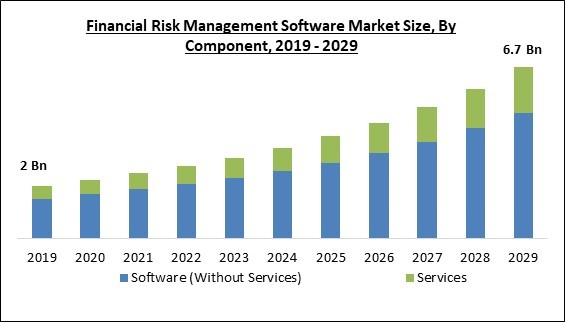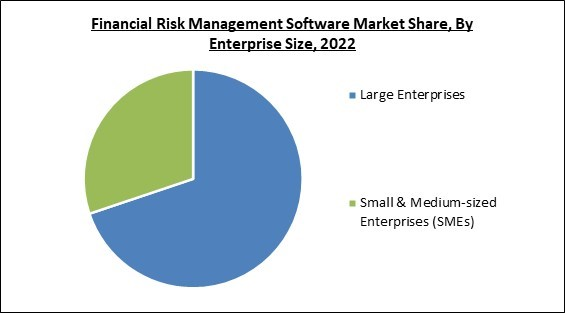The major end user of financial risk management software is insurance companies. Due to the restrictive circumstances, many banks now operate business online. Businesses are implementing risk management software to secure the online platform for their customer database. Thereby, contributing more than 25% revenue of the market share. Some of the factors impacting the market are the increasing complexity of financial instruments, Increased instability in the financial sector, and the difficulty of installing and configuring software.
Financial institutions are adopting sophisticated financial instruments, including derivatives and structured products, to mitigate risks and optimize returns. The increasing intricacy of financial instruments has resulted in a surge in need for financial risk management software as institutions strive to manage their risks and adhere to regulatory mandates effectively, thereby boosting market growth. In recent years, the volatility of the financial sector has heightened, resulting in a rise in the potential for financial losses for institutions. As a result, the current trends demand efficient credit risk software in the banking industry.
However, the market has difficulty due to software installation and configuration complexity. Installing and deploying new software solutions can be challenging and time-consuming in financial institutions because they frequently have complex IT infrastructures with several legacy systems. Thereby, a key factor limiting the market could be the complexity involved with software installation and configuration.
Component Outlook
Based on component, the market is segmented into software (without services) and services. The software (without services) segment dominated the market with maximum revenue share in 2022. This is because such software addresses the challenges faced by businesses today, including heightened regulatory scrutiny, compliance with industry standards and regulations, the rapid expansion of financial data, the need for advanced fraud detection & prevention tools, and the growing threat of cyber-attacks.Enterprise Size Outlook
By enterprise size, the market is classified into large enterprises and small & medium-sized enterprises (SMEs). The large enterprises segment witnessed the largest revenue share in the market in 2022. This is because the prominence of financial risk management has grown, and numerous large corporations have initiated enterprise risk management programs that span their entire organization. In addition, numerous large corporations have enough budget to effectively implement these solutions to detect potential risks and implement appropriate measures to safeguard the organization.Deployment Mode Outlook
On the basis of deployment mode, the market is divided into on-premise and cloud. The cloud segment procured a substantial revenue share in the market in 2022. This is due to the fact that cloud-based financial risk management software is a cutting-edge solution that is managed and operated remotely from a secure location. Cloud solutions are easily accessible through the internet from any location globally, as they are hosted on secure servers. In addition, cloud solutions offer cost-effective advantages over on-premise alternatives as they eliminate the need for hardware or software installation.End-user Outlook
Based on the end-user, the market is bifurcated into banks, insurance companies, NBFCS and credit unions. The insurance companies segment recorded a significant revenue share in the market in 2022. This is due to the fact that insurance companies must comply with cybersecurity regulations at both the state and national levels, in addition to meeting the rigorous security standards set forth by their banking partners. Incorporating additional complexities, it should be noted that state-level security regulations may exhibit a high degree of similarity but may not be entirely uniform across all jurisdictions.Regional Outlook
Region-wise, the market is analyzed across North America, Europe, Asia Pacific, and LAMEA. The North America region led the market by generating the maximum revenue share in 2022. In North America, the market is being propelled by the surge in the adoption of cloud-based solutions, heightened recognition of risk management's significance, and the mounting need for comprehensive risk management solutions that enable enterprises to manage risks with greater effectiveness and efficiency. Moreover, businesses in North America are progressively implementing cloud-based risk management software solutions because of their scalability, cost-efficiency, and user-friendliness.The market research report covers the analysis of key stake holders of the market. Key companies profiled in the report include Oracle Corporation, SAP SE, SAS Institute, Inc., Experian PLC, Fiserv, Inc., Pegasystems Inc., CreditPoint Software, Optial UK Limited, Resolver Inc. (Kroll, LLC) and Lumivero, LLC.
Strategies Deployed in the Market
- Feb-2023: Experian India partnered with the Bank of Maharashtra (BoM), an India-based national bank. The partnership involves Experian providing BoM with solutions across the entire customer lifecycle, thereby enabling the bank to better take care of its existing clients, and on-board new clients.
- Jun-2022: SAS completed the acquisition of Kamakura, a US-based developer, and provider of risk management software. The combination of Kamakura's ALM and interest rate risk capabilities, credit models, and SAS' expertise in credit risk management is a powerful blend of solutions across the whole balance sheet. Further, this acquisition reflects the acquiring company's intentions to accelerate market-changing risk solutions.
- Apr-2021: SAP partnered with Dediq, a Germany-based private equity firm. The partnership involves together expanding SAP's financial services offerings to cater to the dynamic banking and insurance industry. This partnership further strengthens SAP's commitment to the financial services industry.
- Jul-2020: Experian took over a majority stake in Arvato Financial Solutions Risk Management division. The addition of the Arvato Financial Solutions Risk Management division enables Experian to expand its fraud, identity, and risk management services across Austria, Switzerland, and Germany.
- May-2020: Experian India partnered with Redington. The partnership involves reinforcing Experian's decisioning and analytics solutions offering intended for the BFSI industry, and Redington distributing Experian's PowerCurveTM product offering. This partnership reinforces Experian's devotion to supporting the BFSI industry.
- Nov-2019: SAS extended its partnership with Zanders, a Netherlands-based provider of risk consulting and treasury services. Integrating the companies' respective expertise enables the companies to deliver enhanced value to their customers.
Scope of the Study
By Component
- Software (Without Services)
- Services
By Deployment Mode
- On-premise
- Cloud
By Enterprise Size
- Large Enterprises
- Small & Medium-sized Enterprises (SMEs)
By End-user
- Banks
- Insurance Companies
- NBFCs
- Credit Unions
By Geography
- North America
- US
- Canada
- Mexico
- Rest of North America
- Europe
- Germany
- UK
- France
- Russia
- Spain
- Italy
- Rest of Europe
- Asia Pacific
- China
- Japan
- India
- South Korea
- Singapore
- Malaysia
- Rest of Asia Pacific
- LAMEA
- Brazil
- Argentina
- UAE
- Saudi Arabia
- South Africa
- Nigeria
- Rest of LAMEA
Key Market Players
List of Companies Profiled in the Report:
- Oracle Corporation
- SAP SE
- SAS Institute, Inc.
- Experian PLC
- Fiserv, Inc.
- Pegasystems Inc.
- CreditPoint Software
- Optial UK Limited
- Resolver Inc. (Kroll, LLC)
- Lumivero, LLC
Unique Offerings
- Exhaustive coverage
- The highest number of Market tables and figures
- Subscription-based model available
- Guaranteed best price
- Assured post sales research support with 10% customization free
Table of Contents
Companies Mentioned
- Oracle Corporation
- SAP SE
- SAS Institute, Inc.
- Experian PLC
- Fiserv, Inc.
- Pegasystems Inc.
- CreditPoint Software
- Optial UK Limited
- Resolver Inc. (Kroll, LLC)
- Lumivero, LLC










